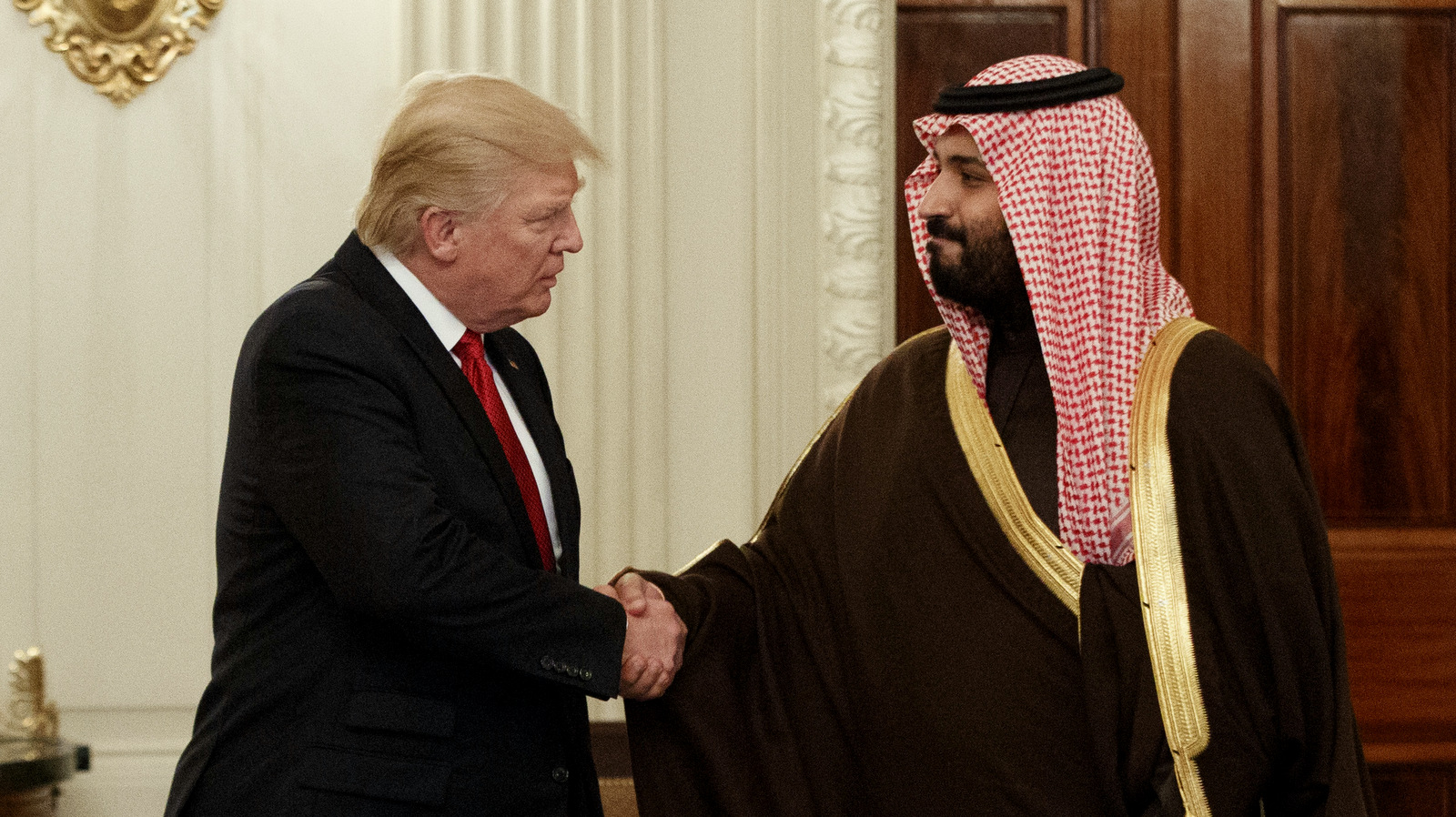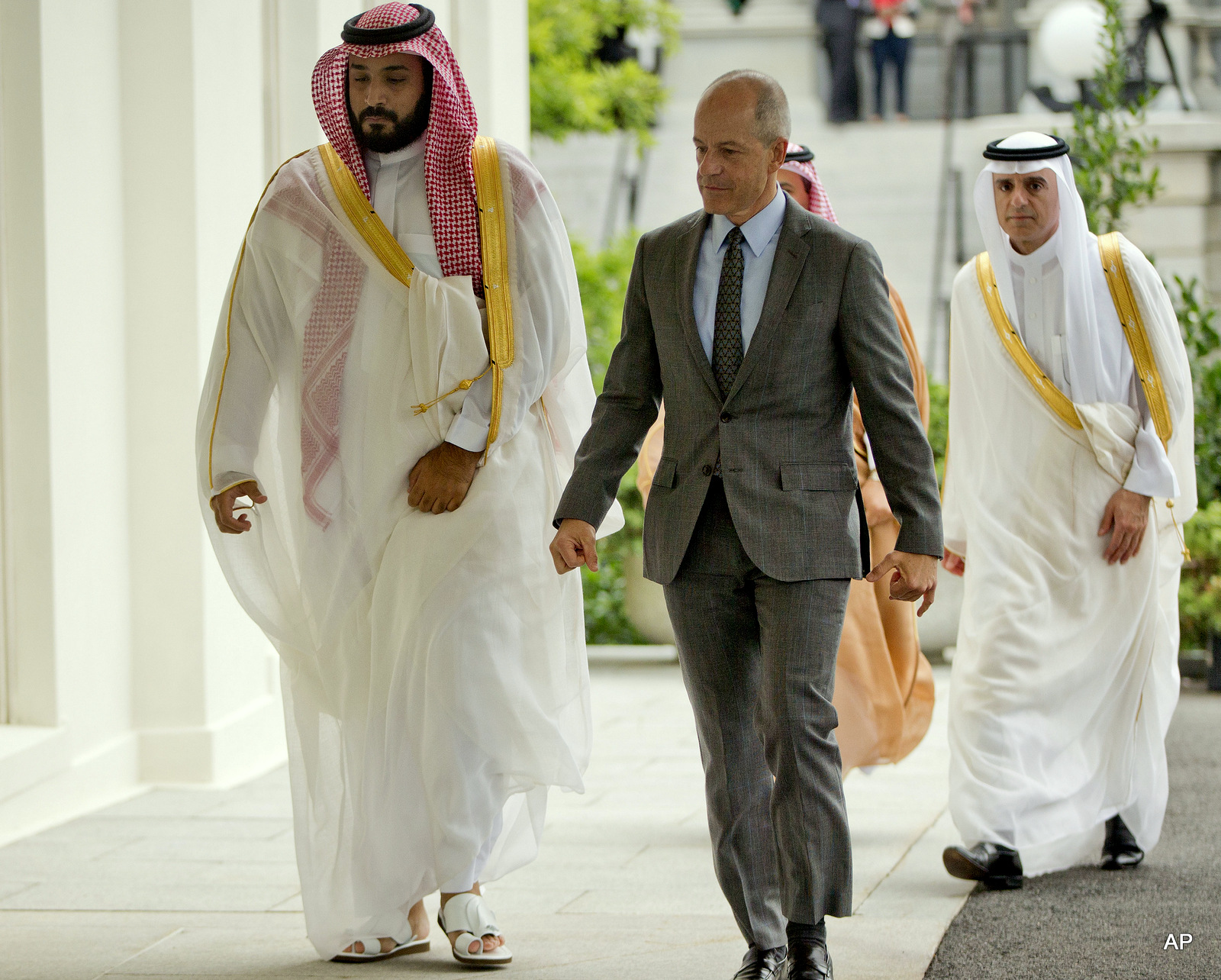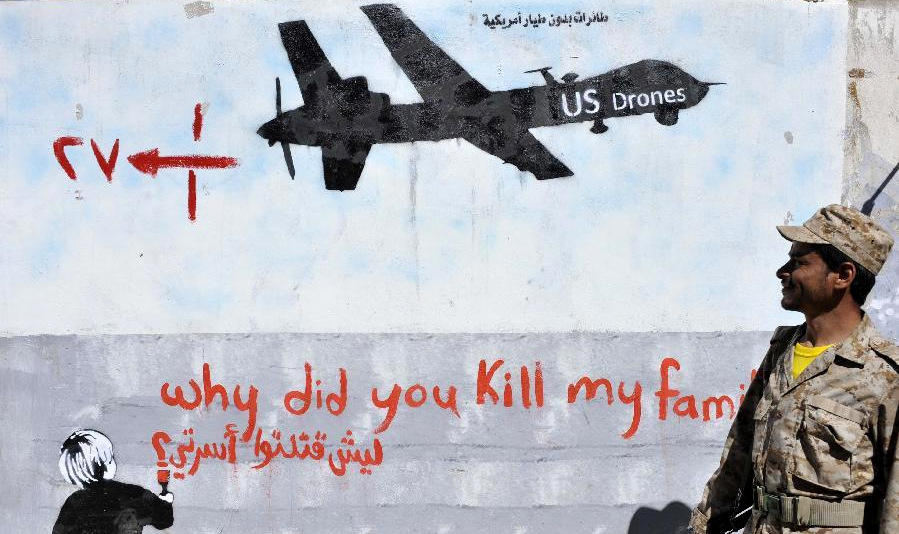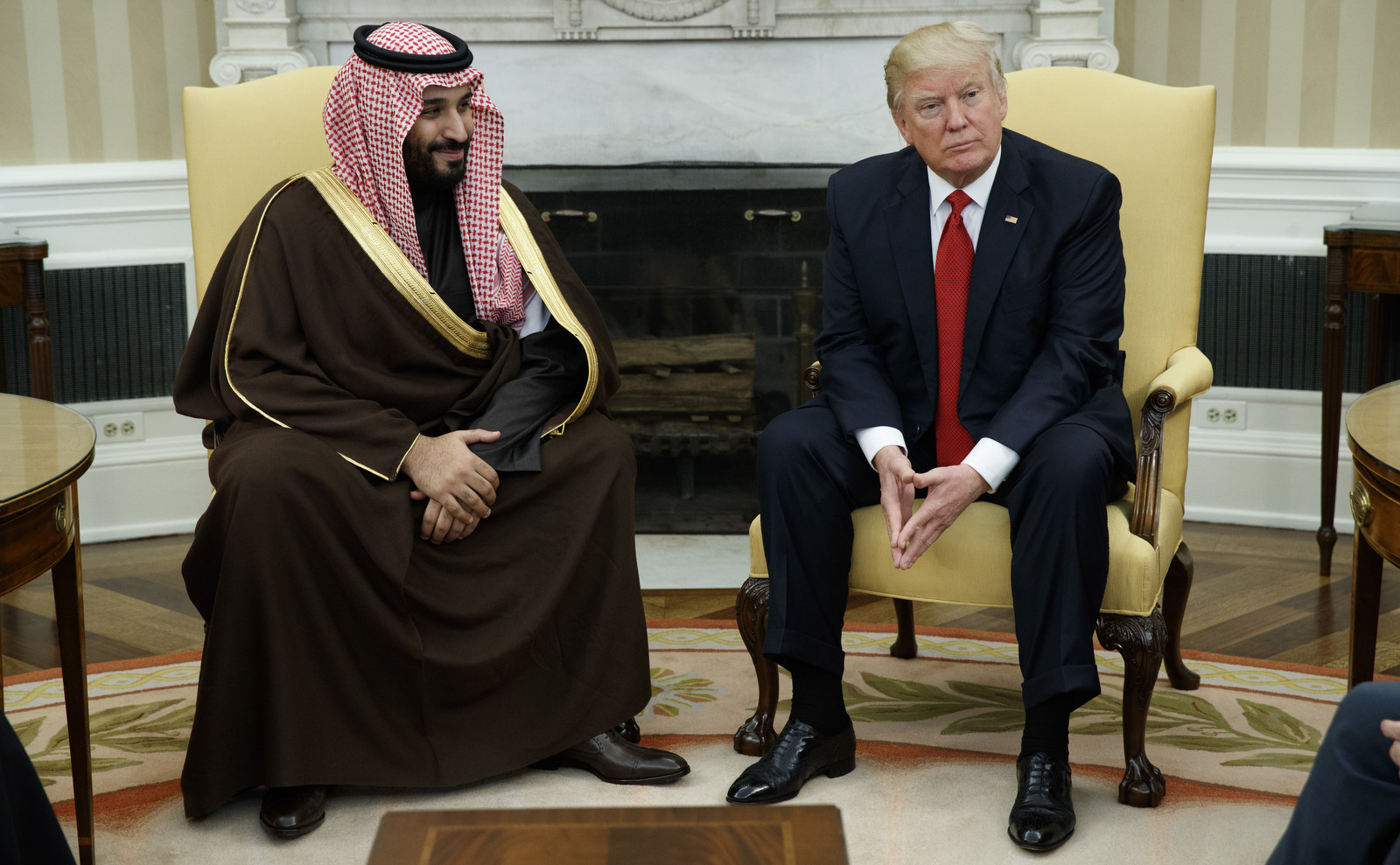
WASHINGTON, DC – One of the major tenets of Donald Trump’s presidential campaign was his promise to bring about “complete American energy independence,” a promise that won him the unwavering support of the U.S. fossil fuel industry and several key endorsements. After his election, Trump appeared to remain committed to this pledge, vowing last November to block all oil imports from Saudi Arabia in order to secure domestic energy independence from “our foes and the oil cartels.”
But Saudi Arabia, as fate would have it, did not stay on Trump’s list of “foes” for very long. Trump’s first meeting last week with a member of the Saudi royal family – Deputy Crown Prince Mohammed bin Salman – marked a “historic turning point,” not only for Trump’s own policies regarding the Gulf monarchy, but for U.S.-Saudi relations as a whole, according to a statement issued by the Saudis after the meeting.
The statement, issued by the deputy crown prince’s senior adviser, added that U.S.-Saudi relations during the Obama era “had undergone a period of difference of opinion.”
It continued:
“However, today’s meeting has put things on the right track, and marked a significant shift in relations, across all political, military, security and economic fields. All of this is due to President Trump’s great understanding of the importance of relations between the two countries and his clear sight of problems in the region. […] After this historic meeting today, cooperation between the two countries will be in its upmost level.”
Considering the long-standing “special relationship” between the U.S. and Saudi Arabia, it’s hard to imagine how the two nations could align even more closely in their policies. But Saudi Arabia’s multiple foreign entanglements that are intended to extend its influence – along with the U.S.’ addiction to Saudi oil – offer Trump the opportunity to prove himself as “a true friend” of the Saudis “who will serve the [Wahhabi] Muslim World in an unimaginable manner.”
However, more seems to be happening behind the scenes. As political analyst Catherine Shakdam told MintPress: “on paper it very much appears as if the Trump administration has given in to Saudi Arabia’s lobbying activities and essentially decided to toe Riyadh’s line against Iran to preserve whatever financial ties exist in between the two allies.”
Yet, with the Saudis “unraveling at the seam,” Shakdam argues that “[Trump’s] stance depends on where the wind will blow next.” This raises the question: could this latest meeting be yet another attempt by Trump to keep foreign leaders – even long-time regional allies – on edge?
The Waning U.S.-Saudi “Special Relationship”

Though U.S. foreign policy consistently puts the country’s own interests above any guarantees based on “loyalty,” the long-standing “special relationship” between Saudi Arabia and the U.S. will not be an easy one to shake. Ever since the post-World War II era began, the Saudis and the U.S. have had a relationship where the U.S. offers the Saudis military and geopolitical “security” in exchange for the Saudi’s most valuable resource: its oil.
This relationship has dominated U.S. foreign policy interests in the Middle East for the better part of the last century, especially after the 1970s, when U.S.-Saudi relations went to the next level with the advent of the petrodollar system.
Despite the petrodollar system’s binding of Saudi (and OPEC) oil sales to the value of the U.S. dollar, events in recent years have shown that not even this powerful system has been enough to keep the U.S. “loyal” to Saudi interests as it had in the past. This manifested most noticeably during the Obama administration, culminating in the Iran nuclear deal – a pact harshly criticized by the Saudis, as well as Trum.
In addition, Obama further angered the Saudis by telling them to “share the neighborhood” with Iran, their greatest regional and economic rival. However, Obama kept relations civil, partly through his massive arms sales to the Saudi kingdom.
Though Trump has adopted rhetoric that the Saudis are eager to hear regarding Iran, his administration’s recent statements on the Iran nuclear deal suggest that he may also adopt a position similar to that of the Obama administration. Last Tuesday, Christopher Ford, the White House National Security Council’s senior director for weapons of mass destruction and counter-proliferation, said the Trump administration will honor a 2015 nuclear agreement with Iran. This latest announcement stands in stark contrast to Trump’s prior statements on the Iran deal, as well as the Saudi’s belief after last week’s meeting that Trump and the Saudis share an alarmist view “on the gravity of the Iranian expansionist moves in the region.”
This latest about-face from the new presidential administration suggests that its previously aggressive stance on Iran may have been a form of posturing meant to please regional allies like Israel and the oil-rich Gulf monarchies. In an interview with MintPress, Shakdam alluded to this, stating that Trump’s change of heart could mean that “the Trump administration is buying itself some time before moving against Saudi Arabia and in favor of Iran.”
But Iran’s “flourishing regional influence” may make a restoration of relations with the Islamic Republic too attractive for Trump to pass up, especially considering that the current president is first and foremost a businessman. Over the last decade especially, Iran has developed a “resistance” economy in response to ongoing U.S. sanctions and other similar measures, a development that has paid off significantly, particularly in the diversification of the Iranian economy and the growth of its electricity exports and increasing economic cooperation with Eurasian nations, as well as geopolitical rivals like Turkey.
Iran’s economic ascendancy is becoming difficult to ignore. As Shakdam pointed out, “A rapprochement in between Iran and the U.S. makes perfect geopolitical sense…economically Iran’s market would offer a much-needed breathing space and guarantee growth. If we consider that the U.S. values capitalism above all else, then a change towards Iran makes perfect sense.”
Iran is increasingly becoming a more attractive potential ally in the region, despite decades of animosity in U.S.-Iranian relations, as Saudi Arabia continues to struggle economically due to its economic reliance on oil exports. While Saudi Arabia’s oil dominance has allowed it to wield great influence in the region for decades, declining oil prices in recent years have taken a drastic toll on the Saudi economy.
In the Saudi kingdom, economic growth is expected to slow to 0.9 percent in 2017, a significant drop from the 10-percent growth seen in 2011, when the price of crude oil was significantly higher. As a result of the slowdown, Saudi Arabia’s credit rating took a major hit on Wednesday when Fitch downgraded the nation due to its soaring fiscal deficit and declining balance sheet.
With the regional influence of the Saudis waning and Iran ascending as a regional power, can the U.S. afford to continue shunning Iran while the powerful and influential Saudi monarchy continues to wane?
War In Yemen Another Key Factor

Though the U.S.’ shifting positions regarding the long-time geopolitical rivalry between Saudi Arabia and Iran is key to gauging Washington’s true intentions in the region, the Saudi conflict in Yemen is another important theater in assessing whether Trump will ultimately emerge as the “true friend” that the Saudis are now expecting.
Since March 2015, the Saudis have been waging a brutal war in Yemen that is bordering on genocide, all with the express intention of maintaining influence and control over the nation’s most strategic geographical feature – the Bab al-Mandab strait, critical to the region’s oil trade. In an effort to drive out resistance to foreign influence in Yemen – led by the Houthi religio-political movement – the Saudis have committed multiple war crimes, resulting in a massive humanitarian crisis that claims the lives of an estimated 1,000 children every week.
While the U.S. has remained silent about Saudi war crimes in Yemen and “assisted” the Saudi campaign with airstrikes and massive arms sales, the Obama administration tried its best to avoid adopting a major role in the conflict while also honoring the decades-old U.S.-Saudi arrangement of security-for-oil.
But under Trump, U.S. involvement in Yemen has already escalated. As Foreign Policy reported, Trump recently dropped more bombs on Yemen in one week than Obama did in an entire year. Not only that, but the now infamous Navy Seal raid in Yemen also happened on Trump’s watch, a raid that was badly botched and resulted in the loss of many civilian lives.
These increases seem to suggest that Trump is seeking to win the approval of the Saudis – at least on this front. However, several analysts have argued that Trump’s escalation of U.S. involvement in Yemen is unlikely to go any further than it already has. Gregory Gause, a professor of international affairs at Texas A&M University and a Saudi specialist, told Bloomberg that “I do not think that the Trump administration wants to get more deeply involved in Iraq, Syria or other places where the Saudis would want help in turning back Iranian influence.”
Shakdam shared Gause’s perspective, saying “President Trump may agree to a few airstrikes [in Yemen] so that he could score military brownie points with Riyadh, but I don’t expect any real commitment. A lot of [U.S. involvement in Yemen] is military posing.”
However, recent suggestions that Trump has little chance of achieving his domestic policy goals “in the absence of starting a new war” could alternatively mean that Trump may be seeking the support of the Saudi military in the event that such a war were to emerge from any one of the armed conflicts currently taking place in the Middle East. The U.S.’ involvement in Yemen, then, could just be another form of appeasement.
Appeasement As Protection – Saudis Could Still Crash The Dollar

Even if Trump and his administration are considering pivoting toward Iran out of economic interest, they will be forced to appease the Saudis regardless. While Saudi influence is diminishing as its national economy weakens, the oil-rich Gulf kingdom still has the ability to unleash economic armageddon upon the U.S. if it so chooses – all thanks to the petrodollar system.
The petrodollar system is dependent on the Saudis and other members of OPEC conducting their oil sale transactions in U.S. dollars, a system that creates artificial demand for the dollar and thus artificially increases the dollar’s value. As the continued existence of this system is dependent on Saudi cooperation, the U.S. cannot blatantly reject its alliance with Saudi Arabia without suffering major consequences. Over the years, the Saudi government has made this quite clear stating blatantly on several occasions that OPEC could crash the dollar if the oil-producing bloc chose to price oil in alternative currencies.
In fact, the Saudis have used the petrodollar system as a bargaining chip in the past, threatening economic warfare against the dollar when they have felt threatened by changes in U.S. policy. For instance, last year, Saudi Arabia threatened to liquidate its U.S. assets and crash the dollar if Congress were to pass a bill allowing the Saudis to be held responsible for their role in the terror attacks of September 11. Though the bill passed, the Saudi threat did not materialize due to an Obama-brokered billion-dollar arms sale to the Saudis – another example of appeasement in action.
The recent meeting between the Saudi deputy crown prince and Trump also shows more evidence of the U.S. bowing to Saudi interests. According to a White House statement issued after the meeting, Trump voiced his support for a new U.S.-Saudi program in which the U.S. will invest – both directly and indirectly – more than 200 billion dollars in the struggling Saudi economy over the next four years. Supporting such a massive investment plan is a clear method of appeasement, considering that Trump recently proposed “dramatic reductions” in foreign aid. Saudi Arabia will likely be excluded from these reductions – just as it was excluded from his temporary travel ban.
But despite Trump’s best efforts to remain predictable and play both sides in the rivalries that dominate Middle East politics, he may have bitten off more than he can chew. He will eventually be forced to choose between the economic interests of the U.S. and its long-standing alliances in the region.

